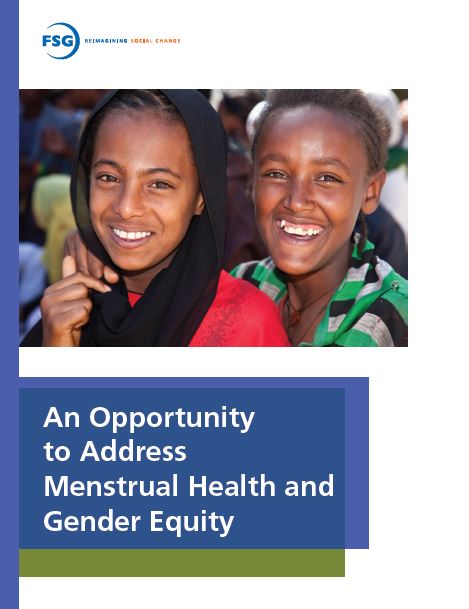An Opportunity to Address Menstrual Health and Gender Equity
 |
rapport May 2016 ; 52 pages
Aut. Alexandra Geertz & Lakshmi Iyer & Perri Kasen &
Ed. FSG - Boston
Téléchargeable sous format: PdF
Téléchargeable chez l'éditeur
Abstract:
Content:
An Opportunity to Address Menstrual Health and Gender Equity covers 1) the state of the evidence linking menstrual health to outcomes; 2) a brief landscape of the problem and the menstrual health sector, including areas of progress and existing gaps; and 3) conclusions and perspectives on opportunities for the field.
Methodology :
This report is prepared with support from the Bill & Melinda Gates Foundation (Foundation). It provides an assessment of the menstrual health sector and identifies opportunities for the field to improve girls’ dignity and empowerment.i This analysis is the result of a review of over 150 peer-reviewed articles and grey literature, interviews with 37 global experts, 70-plus interviews with experts and practitioners in India, Kenya, and Ethiopia, and a review of relevant programming focused on menstruation, MHM, and sexual reproductive health. The research focused on sub-Saharan Africa and Asia, priority areas for the Foundation, and was complemented by a sampling of research from developed countries and emerging economies (e.g., the United States, Germany, and China). The research focuses on girls’ journeys through adolescence
between ages 10 and 19.
The research also includes an in-depth assessment of the state of menstrual health in India, Kenya, and Ethiopia driven by an extensive literature review and set of conversations with experts and practitioners. The report intends to provide an overview of the current landscape and outline programmatic, policy, and advocacy approaches that could address menstrual health needs. This assessment included 126 interviews with adolescent girls in the following categories: (1) early post-menarche (0 to 1 year after menarche); (2) post-menarche (1 to 3 years after menarche); and (3) late post-menarche (3-plus years after menarche up to 18 years old). Interviews were also conducted with 55 influencers including mothers, sisters, teachers, and community health care workers. The interviews with adolescent girls and influencers were led and conducted by Routes 2 Results and their in-country partners in India (Rajiv and Anju Bala Bhatia, founders of Fact-Indepth), Kenya (Carolyne Muthoni Njihia, founder of Measure Associates), and Ethiopia (Feven Busa, qualitative research expert, and Efera Busa, research director, at Waas International).
Public-Cible:
Mots clefs: |
femme (CI) (DT) (OP) (ope) , genre (CI) (DT) (OP) (ope) , hygiène menstruelle (CI) (DT) (OP) (ope) |
Pays concernés: |
Ethiopie (CI) (DT) (OP) , Inde (CI) (DT) (OP) , Kenya (CI) (DT) (OP) |
Editeur/Diffuseur: |
|
FSG
-
FSG Reimagining social change - Boston - Etats Unis |
En cas de lien brisé, nous le mentionner à communication@pseau.org